
Salisbury is the second studio album by English rock band Uriah Heep, released in January 1971 by Vertigo Records in the UK and Mercury Records in the US. It was produced by Gerry Bron.
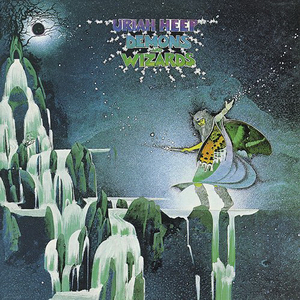
Demons and Wizards is the fourth studio album by English rock band Uriah Heep, released in May 1972 by Bronze Records in the UK and Mercury Records in the US.
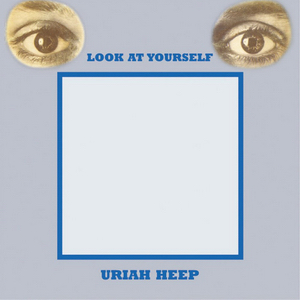
Look at Yourself is the third studio album by English rock band Uriah Heep, released in September 1971 by Bronze Records in the UK and Mercury Records in the US. It was the last Uriah Heep album to feature founding member and bassist Paul Newton.
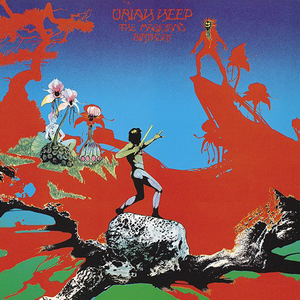
The Magician's Birthday is the fifth studio album by English rock band Uriah Heep, released in November 1972 by Bronze Records in the UK and Mercury Records in the US. The concept was "based loosely on a short story" written by keyboardist Ken Hensley in June and July 1972.

Sweet Freedom is the sixth studio album by English rock band Uriah Heep, released in September 1973 by Bronze Records in the UK and Warner Bros. Records in the US.

Wonderworld is the seventh studio album by English rock band Uriah Heep, released in 1974 by Bronze Records in the UK and Warner Bros. Records in the US. Wonderworld was the last Uriah Heep album to feature bass player Gary Thain.

Uriah Heep Live is a double live album by British rock group Uriah Heep, released in April 1973 in the US by Mercury Records, and in May 1973 in the UK by Bronze Records. It was the band's first live album. The album was recorded by the Pye Mobile Unit, with Alan Perkins as engineer.
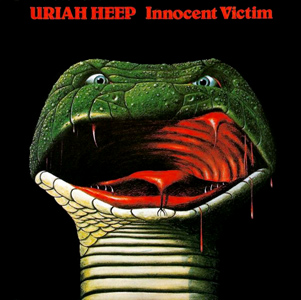
Innocent Victim is the eleventh studio album by English rock band Uriah Heep, released in November 1977 by Bronze Records in the UK and Warner Bros. Records in the US.

Firefly is the tenth studio album by English rock band Uriah Heep. It was released in February 1977 by Bronze Records in the UK and Warner Bros. Records in the US. It was their first album without lead vocalist and founding member David Byron, and the first of three albums with new singer John Lawton, formerly of Lucifer's Friend. Bassist Trevor Bolder made his Uriah Heep debut on this album. Barring a break of about 18 months in the early 1980s, he remained with the group until his death in 2013.

High and Mighty is the ninth studio album by English rock band Uriah Heep, released in May 1976 by Bronze Records in the UK and Warner Bros. Records in the US. High and Mighty was the last Uriah Heep album to feature bassist John Wetton, and vocalist and founding member David Byron who was fired later that year due to his troubles with alcohol and differences with band priorities.

Fallen Angel is the twelfth studio album by English rock band Uriah Heep, released in September 1978 by Bronze Records in the UK and Chrysalis Records in the US. It is the last album to feature John Lawton on vocals, before his firing in 1979. Fallen Angel only reached No. 186 on the Billboard 200, but in Germany, the band were at the height of their popularity. On this album, the band moved toward an AOR sound, as opposed to the progressive rock of previous albums.
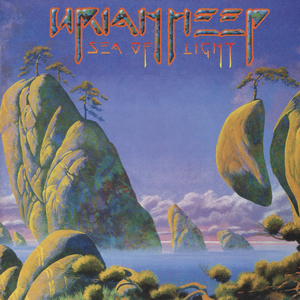
Sea of Light is the 19th album by the British rock band Uriah Heep, released in April 1995. Its songs have remained part of the band's live set to this day. Bassist Trevor Bolder sang lead on "Fear of Falling" and delivered four songs for this album, as many as on the predecessor Different World, a count he never reached before or after. Roger Dean was responsible for the sleeve painting, his third for Uriah Heep.

Conquest is the thirteenth studio album by English rock band Uriah Heep, released in 1980. It was released worldwide by Bronze Records; however, the album was never released in North America, where it was difficult to find even as an import.
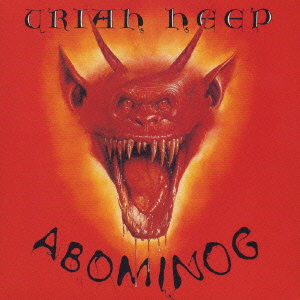
Abominog is the fourteenth studio album by English rock band Uriah Heep, released in April 1982 by Bronze Records in the UK, and on 12 July 1982 by Mercury Records in the US. It was their first album without keyboardist Ken Hensley. The album was critically acclaimed and fairly commercially successful, due in part to the band retooling and updating their sound to a contemporary style and delivering a "punchier, more pop metal era-appropriate effort.

Head First is the fifteenth studio album by English rock band Uriah Heep. It was released in May 1983 by Bronze Records in the UK and Mercury Records in the US. It is Uriah Heep's last album released by Bronze Records.

Take No Prisoners is the debut solo album of British rock singer David Byron. It was released while he was still vocalist for Uriah Heep, and features Heep bandmates Mick Box and Lee Kerslake, as well as Ken Hensley and John Wetton on select tracks.
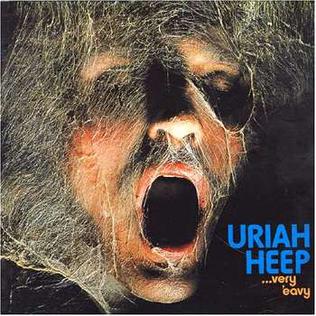
...Very 'Eavy ...Very 'Umble is the debut studio album by English rock band Uriah Heep. It is recognized as a foundational album in heavy metal music.

"Prima Donna" is a song by British rock band Uriah Heep from their eighth studio album Return to Fantasy (1975), released as the first single from the album. The song was written by David Byron, Mick Box, Lee Kerslake and Ken Hensley. It was recorded in May 1975 in Lansdowne and Morgan Studios, London. The song reached number ten in Denmark and number three in Norway.

"Return to Fantasy" is a song by British rock band Uriah Heep from their eighth studio album Return to Fantasy (1975). The song was written by David Byron and Ken Hensley and was the last single by the group to feature David Byron on lead vocals. The song was recorded in May 1975 in London in the Lansdowne and Morgan studios.

"One Way or Another" is a song by English rock band Uriah Heep. It was released on their ninth studio album High and Mighty in May 1976, and became the only single from the album and the last single with the band's former vocalist, David Byron. The song was written by Ken Hensley and featured lead vocals from John Wetton and Ken Hensley. It was recorded from December 1975 to March 1976 in Roundhouse Recording Studios in London. The single did not chart, and it is the only song on the album that was not sung by David Byron.




















